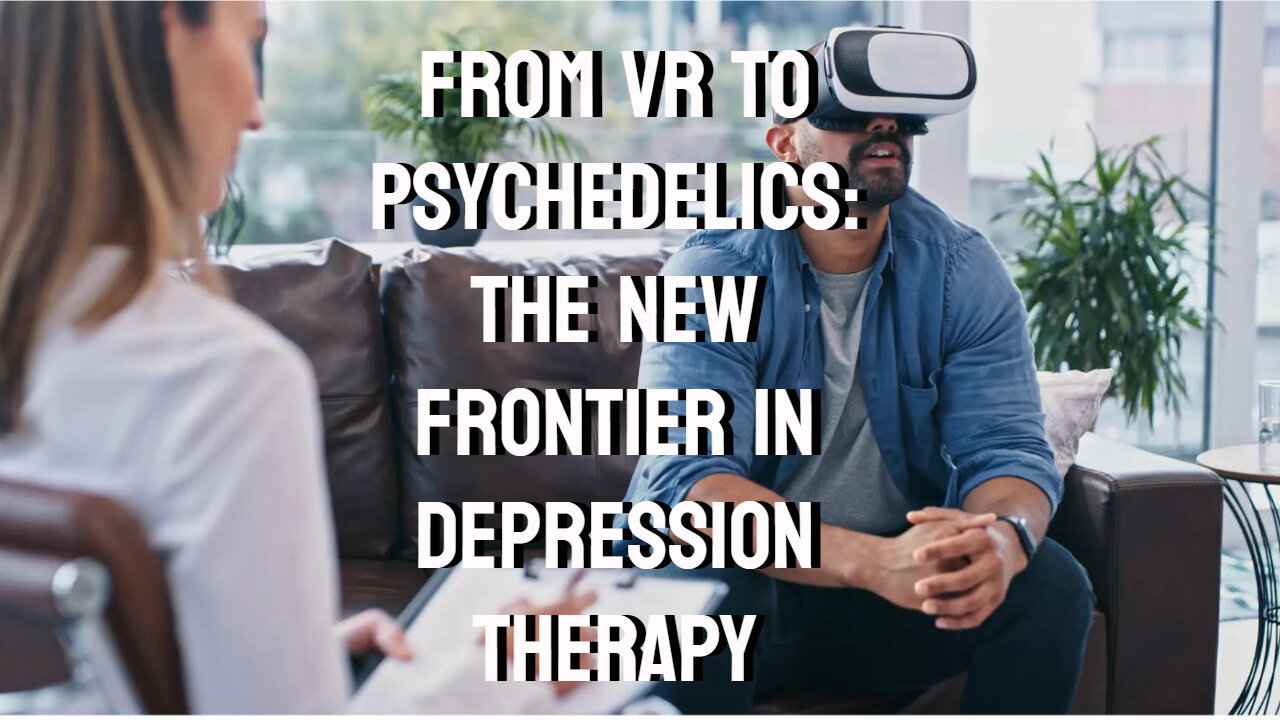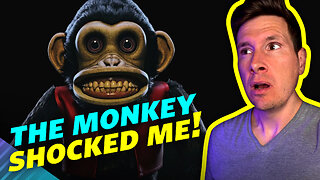Premium Only Content

From VR to Psychedelics: The New Frontier in Depression Therapy
From VR to Psychedelics: The New Frontier in Depression Therapy
Imagine a world where battling depression doesn't just involve traditional talk therapy or medication. Picture a place where cutting-edge technology and ancient, natural remedies come together to create groundbreaking solutions for mental health. Welcome to the new frontier in depression therapy, where virtual reality and psychedelics are transforming the way we treat this pervasive condition.
Depression is more than just feeling sad; it's a debilitating illness that affects millions worldwide. Despite the availability of numerous treatment options, many people still struggle to find effective solutions. This is where innovative therapies come into play, offering new hope and possibilities for those in need.
The Problem with Traditional Treatments:
Traditional depression treatments, such as antidepressant medications and cognitive-behavioral therapy (CBT), have helped countless individuals. However, they aren't one-size-fits-all solutions. Medications often come with side effects, and therapy can be a long, arduous process. For some, these methods don't provide the relief they desperately seek. This is why exploring new, innovative therapies is crucial.
The Promise of Virtual Reality:
Virtual reality (VR) is no longer just for gamers and tech enthusiasts. It's making waves in the mental health field, offering immersive experiences that can significantly improve therapeutic outcomes.
How VR Works in Therapy:
Imagine stepping into a virtual world specifically designed to help you confront and manage your depression. VR therapy allows users to engage in controlled environments where they can practice coping strategies, face their fears, and learn new skills. For instance, a VR program might simulate social situations to help individuals with social anxiety, a common symptom of depression, practice their interactions in a safe space.
Success Stories and Research:
Studies have shown promising results. A recent study conducted by Oxford University found that VR therapy significantly reduced symptoms of depression and anxiety in participants. Patients reported feeling more confident and better equipped to handle real-life situations after undergoing VR therapy.
You might be thinking, "Isn't VR expensive and inaccessible?" While it's true that VR technology can be costly, the growing interest in its therapeutic applications is driving prices down and increasing availability. Moreover, many therapy clinics are beginning to invest in VR setups, making this innovative treatment more accessible to a broader audience.
The Power of Psychedelics:
Psychedelics, once dismissed and stigmatized, are now at the forefront of mental health research. Substances like psilocybin (found in magic mushrooms) and MDMA are being studied for their profound effects on depression.
How Psychedelics Work:
These substances work by altering brain chemistry and promoting neuroplasticity—the brain's ability to reorganize itself by forming new neural connections. This can lead to profound changes in perception, mood, and thought patterns, often helping individuals break free from the grip of depression.
Clinical Trials and Success Stories:
Clinical trials are yielding remarkable results. Johns Hopkins University conducted a study on psilocybin-assisted therapy for treatment-resistant depression, showing that a significant number of participants experienced substantial relief from their symptoms. Similarly, MDMA-assisted therapy for PTSD, often comorbid with depression, has shown promise in reducing symptoms and improving overall mental health.
Concerns about the safety and legality of psychedelics are valid. It's important to note that these treatments are administered in controlled, clinical settings under the supervision of trained professionals. Moreover, ongoing research and advocacy are paving the way for legal and safe access to these therapies in the near future.
You might be wondering, "How exactly do these treatments work, and what can I expect?" Let's dive deeper into each therapy and explore what a typical session looks like.
Virtual Reality Therapy Sessions:
A typical VR therapy session involves wearing a VR headset and engaging in various therapeutic exercises. For example, you might find yourself in a serene virtual environment designed to induce relaxation and mindfulness. Guided by a therapist, you'll navigate these environments, practicing stress-reduction techniques and confronting triggering situations in a controlled manner.
Psychedelic-Assisted Therapy Sessions:
In psychedelic-assisted therapy, the substance is administered in a safe, clinical setting. A therapist guides you through the experience, helping you process emotions and insights that arise. These sessions often involve preparatory meetings and follow-up integration sessions to ensure that the therapeutic benefits are long-lasting.
How to Access These Innovative Therapies:
If you're intrigued by these new therapies, you're not alone. Many people are eager to explore these cutting-edge treatments. Here's how you can get started:
Research and Educate Yourself:
Learn more about VR and psychedelic therapies by reading articles, watching documentaries, and listening to expert interviews. The more you know, the better prepared you'll be to make informed decisions.
Consult with Mental Health Professionals:
Talk to your therapist or psychiatrist about your interest in these therapies. They can provide guidance on whether these treatments are suitable for you and help you find reputable clinics and practitioners.
Explore Clinical Trials:
Participate in clinical trials to gain access to these innovative treatments. Websites like ClinicalTrials.gov list ongoing studies that you might be eligible for.
Join Support Communities:
Connect with others who have experienced these therapies. Online forums and support groups can provide valuable insights and support as you navigate this new frontier.
The landscape of depression therapy is evolving rapidly, offering new hope for those who struggle with traditional treatments. From the immersive worlds of virtual reality to the transformative experiences of psychedelics, these innovative therapies are opening doors to new possibilities for mental health. If you're seeking a fresh approach to managing your depression, exploring these cutting-edge treatments could be the first step toward a brighter, healthier future.
-
 LIVE
LIVE
Conspiracy Pilled
11 hours agoAvowed
67 watching -
 5:31
5:31
Adam Does Movies
22 hours ago $2.08 earnedThe Monkey Movie Review - This Is From The Longlegs Director?
19.2K3 -
 14:47
14:47
Tactical Considerations
15 hours ago $3.02 earnedClassic Precision Woox Furiosa Bergara Premier 6.5 CREED
21.3K1 -
 40:44
40:44
Rethinking the Dollar
23 hours agoDonald & Elon Head to Fort Knox—What Are They Planning?
14.4K17 -
 1:10:15
1:10:15
MTNTOUGH Fitness Lab
1 day ago"My Baseball Career Wasn't Enough": Adam LaRoche's Life-Changing Anti-Trafficking M
12.6K3 -
 1:00:12
1:00:12
The Tom Renz Show
19 hours agoComing to America & Coming to Christ
41.1K7 -
 1:12:21
1:12:21
TheRyanMcMillanShow
1 day ago $0.43 earnedDebbie Lee: Mother of First Navy Seal Killed In Iraq, Marc Lee - RMS 019
17.2K1 -
 38:05
38:05
Uncommon Sense In Current Times
17 hours ago $0.99 earnedIs Israel Being Forced Into a Bad Deal? David Rubin Exposes the Truth | Uncommon Sense
22.7K14 -

FreshandFit
11 hours agoAfter Hours w/ Girls
130K97 -
 2:33:58
2:33:58
TimcastIRL
14 hours agoDan Bongino ACCEPTS Deputy FBI Director, SECRET NSA CHATS EXPOSED w/Joey Mannarino | Timcast IRL
197K113